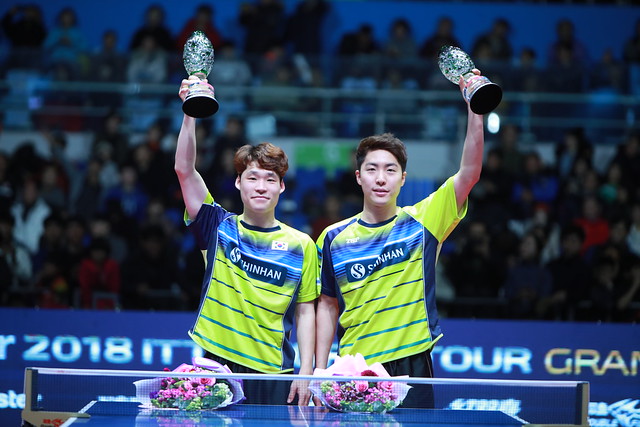by Ian Marshall, Editor
At the final hurdle, China’s Wang Liqin and Yan Sen gave a display that made you blink in disbelief; in an era when it was best of five games, each game to 21 points and the change of service after five points, they beat the combination of Germany’s Jörg Rosskopf and Vladimir Samsonov of Belarus in an error free performance (21-12, 21-10, 21-14). The significance was that at the semi-final stage, Jörg Rosskopf and Vladimir Samsonov had beaten the most renowned Chinese pair at the time Wang Tao and Lu Lin (24-22, 21-17, 12-21, 21-14)
It was some win, Wang Tao and Lu Lin had been crowned World champions in 1993 in Stockholm and had retained the title in 1995 in Tianjin, whilst at the 1992 Olympic Games, they had been gold medallists and runners up four years later in Atlanta.
Wang Tao and Lu Lin pursued the policy of a left hander partnering a right hander; moreover, they added an extra ingredient. Wang Tao was a shake-hands grip player, Lu Lin a pen-holder; that successful policy was followed by Wang Liqin and Yan Sen, later by Chen Qi and Ma Lin. Overall Wang Liqin and Yan Sen progressed to win the Men’s Doubles title at the Grand Finals three times, Chen Qi and Ma Lin won twice.
Now in the Incheon there is a pair of a similar ilk in action; Hong Kong’s Ho Kwan Kit and Wong Chun Ting, the former a right handed pen-holder, the latter a left hand shake-hands grip player.
Last year at the Grand Finals in Astana, in the title decider they held a significant lead in the deciding game against Japan’s Masataka Morizono and Yuya Oshima, only to experience defeat; early this year they reversed the decision in the final at the Seamaster 2018 Hong Kong ITTF World Tour Open.
Round three in Incheon but could it prove to be the final? Can Ho Kwan Kit and Wong Chun Ting scintillate like Wang Liqin and Yan Sen, over two decades ago?







